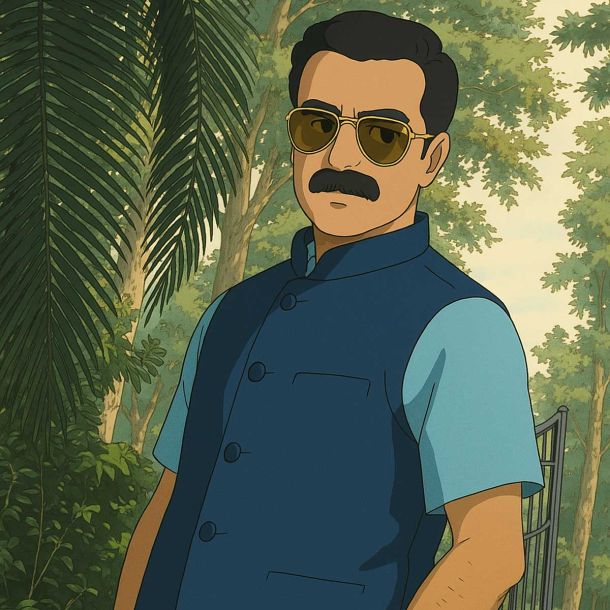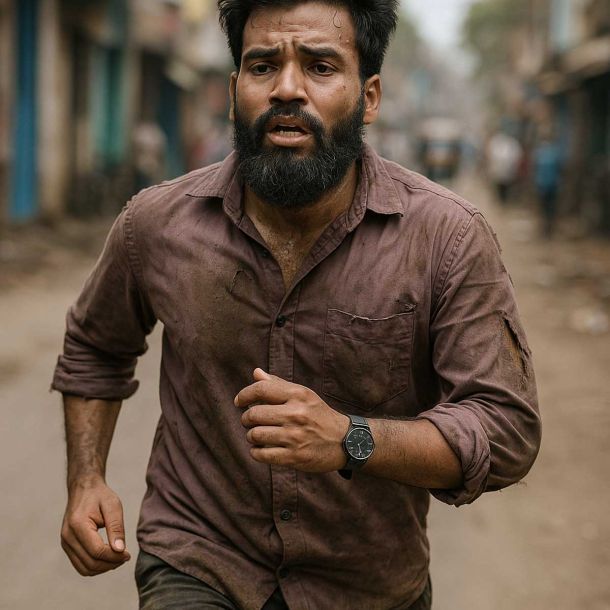More Coverage
Twitter Coverage
Satyaagrah
Written on
Satyaagrah
Written on
Satyaagrah
Written on
Satyaagrah
Written on
Satyaagrah
Written on
Join Satyaagrah Social Media
Birsa Munda: The tribal folk hero who was God to his people by the age of 25

Birsa Munda was an Indian tribal freedom fighter, religious leader and folk hero belonging to the Munda tribe of the Chhotanagpur Plateau area. In the 19th century, Birsa Munda started a tribal religious Millenarian Movement in the Bengal Presidency (Present-day Jharkhand).
Birsa Munda: Early Life
Birsa Munda was born on November 15, 1875, to Sugana Munda and Karmi Hatu in Ulihatu, Bengal Presidency (Present-day Jharkhand). He was born on Thursday, hence, as per Munda tribe customs, he was named after the day. Birsa Munda's family moved to Kurumbda and then to Bamba in search of the employment, either as labourers or crop-sharers.
Due to poverty, Birsa Munda was sent to his maternal uncle's village-- Ayubhatu. Munda lived at Ayubhatu for two years and was surrounded by Christian missionaries. These missionaries attacked the old Munda order and wanted to convert people into Christianity. At Ayubhatu, Birsa went to a missionary school and his teacher encouraged him to study further. He was advised by his teacher to enrol in German Mission School, but to get admitted, Munda was forced to convert to Christianity. He was renamed as Birsa David and later to Birsa Daud after the conversion. Birsa left the German Mission School after studying for a few years.
During 1886-1890 (the period of German and Roman Catholic Christian agitation), Birsa stayed at Chaibasa, but in the wake of freedom struggle, Munda's father withdrew him from school and left the place. The family also renounced Christianity and reverted to their original tribal religious customs.
On his temporary stay, Birsa found a suitable companion in the neighbourhood village Sankara. He presented her parents with jewels and explained the reasons behind his idea of marriage. However, on his return from jail, he didn't found her loyal and left her. The daughter of Mathura Muda (kept by Kali Munda) and wife of Jaga Munda insisted Birsa on becoming his wives, to which he rebuked. Sali from Burudih stayed with Munda for a long time. When Birsa Munda grew old, he stressed monogamy. Birsa was jailed due to a rumour that the people who will not follow Birasait would be massacred.
Birsa Munda and his new religion
Birsa Munda was also a founder of a new religion called Birsait. The religion believed in one God and encouraged them to revert to their original religious beliefs. People started referring to him as an economical religion healer, a miracle-worker and a preacher. People belonging to the tribe of Mundas, Oraons and Kharias moved together to visit the new prophet and to find a cure to their problems. People belonging to Oraon and Munda became convinced Birasaities. People started referring him Dharti Abba. Several contemporary and folk songs reveal his influence over the people of various tribes.
Birsa Munda not only preached the new religion but also mobilised people and formed the Guerrilla Army to end British Raj. His slogan threatening the British Raj is still remembered today in the states of Odisha, Bihar, West Bengal and Madhya Pradesh. The slogan was 'Abua raj seter jana, maharani raj tundu jana' which means 'Let the kingdom of the queen be ended and our kingdom will be established'.
Birsaits and their revolts
In the late 1890s, Birsa Munda abolished the feudal system introduced by the Britishers in the Adivasi forest. Under this system, migrants from other states were invited by the British to work over tribal lands and to pocket all the profits. This, in turn, deprived the owners of their proprietary rights over the land and were left with no means of livelihood. Thus, due to the agrarian breakdown and culture change, Birsa along with his tribe revolted.
In 1895, Birsa asked his fellow tribesman to renounce Christianity and guided them to worship one God and showed them the path of purity, austerity and prohibited cow- slaughters. He further claimed himself to be a prophet and stated that reign of Queen Victoria was over and the Munda Raj has begun. His followers declared that the British were their real enemies and not the Christian Mundas.
The followers of Birsa Munda started a series of attack on several places loyal to the British (police station, shops, etc.). They also killed two police constables, razed the houses of local shopkeepers, attacked commissioners and deputy commissioners. The British in return set a reward of Rs. 500 on Birsa Munda and sent an army of 150 people to crush the rebellion. The forces gheraoed the Guerrilla Army at Dumbari Hills and killed hundreds of people. Birsa managed to escape but was later on arrested and sent to jail.
During his trial in the prison, Birsa Munda died on June 9, 1900. The movement faded out after his death. Eight years after his death in 1908, the colonial government introduced the Chotanagpur Tenancy Act (CNT). This Act prohibited the transfer of tribal lands to non-tribals and protected the proprietary rights of the owners.
Birsa Munda and his legacy
Birsa Munda's legacy is still alive and tribal peoples of Karnataka and Jharkhand celebrate his birth anniversary on November 15. Many institutions and organizations-- Birsa Agricultural University, Birsa Institute of Technology, Birsa College Khunti, Birsa Institute of Technology Sindri, Sidho Kanho Birsha University, Birsa Munda Athletics Stadium, Birsa Munda Airport, Birsa Munda Central Jail, Birsa Seva Dal, Birsa Munda Tribal University-- are named after him.
In 2004, Ashok Saran made a Hindi film 'Ulgulan-Ek Kranti' and 500 Birsaits appeared as extras in the movie. In 2008, another film 'Gandhi se Pehle Gandhi' based on the novel on the life of Birsa Munda and was directed by Iqbal Saran (author of the novel).
Mahasweta Devi wrote a novel 'Aranyer Adhikar' on the life of Birsa Munda and his rebellion against British Raj. The novel won her the Sahitya Akademi Award for Bengali in 1979.
150-foot-tall Statue of Ulgulan (Birsa Munda) is proposed to be built in Jharkhand. The stones to be used in the statue are collected from the local houses of the area.
Eight years after his death, the colonial government introduced the Chotanagpur Tenancy Act in 1908, which prohibits the transfer of tribal land to non-tribals.
A century after his death, Jharkhand was carved out of Bihar on his birth anniversary on November 15, 2000, and he is today fondly referred to as “Mr Jharkhand.”
The young tribal revolutionary’s life and legacy continue to be celebrated even today, particularly in the tribal regions of Bihar, Jharkhand and even parts of Karnataka and Odisha. His birth anniversary is celebrated by tribals in Mysore and Kodagu districts of Karnataka, and an official function is held annually at his Samadhi Sthal at Kokar, Ranchi, the capital of Jharkhand.
He is the only tribal leader whose portrait hangs in the Central Hall of Parliament. The portrait, which was unveiled by the Speaker of the Lok Sabha, Dr Balram Jakhar on 16 October 1989, was commissioned by the Birsa Munda statue committee, Rourkela.
Two Hindi movies -- Ulgulan – Ek Kranti (2004) and Gandhi Se Pehle Gandhi (2008) –were based on his life. The latter was directed by Iqbal Durrani, based on his novel with the same name.
Ramon Magsaysay Award Winner and Activist Mahasweta Devi’s historical novel, Aranyer Adhikar ( Right to the Forest, 1977) for which she won the Sahitya Akademi Award for Bengali in 1979, is based on Munda’s life and his rebellion against the British Raj in the late 19th century. The war cry of the Indian Army’s Bihar Regiment is Birsa Munda Ki Jai or Victory to Birsa Munda.
Birsa’s life was driven by poverty, but he still set a powerful example for the youth to emulate by giving more to society than what is taken. His contribution to modern India is significant, but unfortunately, he has been relegated to the background in today’s times.
 Support Us
Support Us
Satyagraha was born from the heart of our land, with an undying aim to unveil the true essence of Bharat. It seeks to illuminate the hidden tales of our valiant freedom fighters and the rich chronicles that haven't yet sung their complete melody in the mainstream.
While platforms like NDTV and 'The Wire' effortlessly garner funds under the banner of safeguarding democracy, we at Satyagraha walk a different path. Our strength and resonance come from you. In this journey to weave a stronger Bharat, every little contribution amplifies our voice. Let's come together, contribute as you can, and champion the true spirit of our nation.
 |  |  |
| ICICI Bank of Satyaagrah | Razorpay Bank of Satyaagrah | PayPal Bank of Satyaagrah - For International Payments |
If all above doesn't work, then try the LINK below:
Please share the article on other platforms
DISCLAIMER: The author is solely responsible for the views expressed in this article. The author carries the responsibility for citing and/or licensing of images utilized within the text. The website also frequently uses non-commercial images for representational purposes only in line with the article. We are not responsible for the authenticity of such images. If some images have a copyright issue, we request the person/entity to contact us at This email address is being protected from spambots. You need JavaScript enabled to view it. and we will take the necessary actions to resolve the issue.
Related Articles
- The Forgotten Story of Rani Abbakka Chowta, the Fearless Warrior Queen of Tulu Nadu
- An Artisan Heritage Crafts Village: Indigenous Sustainability of Raghurajpur
- The forgotten temple village of Bharat: Maluti
- The Untold Story of the Brave Maratha Warrior Queen Ahilyabai Holkar!
- Gita Press Gorakhpur – Bringing Sacred Hindu Texts to Every Hindu Home
- अथ रामचरितमानस प्रकाशन कथा: गीता प्रेस, गोरखपुर ने 1938 से रामचरितमानस का प्रकाशन शुरू किया
- Dear NSUI, Bhagat Singh And Subhas Chandra Bose Admired Savarkar And His Ideas
- Jagannath Temple administration issues clarification on proposed sale of temple lands
- Culture And Heritage - Meenakshi Temple Madurai
- History books should teach India’s civilisational, linguistic heritage, not unfounded claims: Parliamentary Committee meets to discuss NCERT books
- Biggest Wonder of the World : Kitchen of Lord Shri Jagannath
- A new symbol of Hindutva pride, Shri Kashi Vishwanath Temple Corridor
- Unsung Heroine Pritilata Waddedar, Who Shook The British Raj at the age of 21
- Shri Murudeshwar Temple: Home To The World’s Second Tallest Shiva Statue
- Srikalahasti Temple, Dakshina Kailash
























